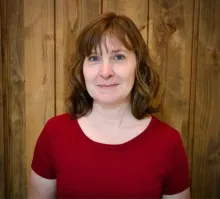From Polio to COVID-19: An Award-Winning Oral History Project Reflects Vaccine Hesitancy Across Generations

Adobe Stock
Johanne Harrigan, a history graduate student in the Department of History in the College of Social and Behavioral Sciences, was awarded an SBSRI Pre-Doctoral Research Grant in 2023 for her history-based research, which explores themes of vaccine hesitancy and memory.

Johanne Harrigan
Harrigan's interest in the history of polio was sparked by the firsthand accounts she heard from her patients during her career as a medical social worker specializing in geriatrics.
“The people I would talk to would talk about how in the 1950s people were afraid of catching polio. It was very frightening to them — they were worried about their children,” Harrigan said.
These patients also remembered the sense of relief they felt when the first polio vaccine, the Salk vaccine, was introduced.
“It was one of those questions that would come up periodically, like, ‘Where were you when John F. Kennedy was shot?’” Harrigan said. “Someone always had a story to share about polio.”
When the COVID-19 pandemic began and the discussion turned to a potential vaccine, Harrigan couldn’t help but compare it to the polio vaccine. While working part-time in senior care during the pandemic, she began asking her patients about their thoughts on vaccination.
“I was talking to one of my patients about how parents were hesitant to get their kids COVID vaccinated and she was shocked,” Harrigan said.
Having lived through the polio era, this patient could hardly comprehend the idea of refusing a vaccine. Harrigan knew then that she wanted to explore the polio vaccine further by interviewing more people.
“It was very relevant in the time of COVID because we were talking about vaccines for something, we were talking about fears, and we were talking about waiting for a vaccine just as they had waited for a vaccine,” Harrigan said.
Although polio rates dropped after 1955, they started to stall. In another research paper, Harrigan found out that in the late 50s and early 60s, rates of polio vaccinations weren’t high enough for immunity.
While reading a book in 2020 called Epidemics in Society, Harrigan learned that polio eradication didn’t begin until the Sabin vaccine, which was approved in 1962.
“This book told me that Pima and Maricopa counties in Arizona were the first to implement a mass vaccination campaign for this new vaccine, and it was really a big deal.” Harrigan said.
Other places in the country began to implement the same program. Harrigan found this to be neat local history and something she wasn’t aware of. With little information available on this situation, Harrigan knew that she wanted to write about it.
“As I did this research, what I found missing were people’s stories. There were a lot of newspaper reports of the time, and I could find letters between Albert Sabin and some of the medical directors but I couldn’t get very personal stories about why people decided to go get vaccinated,” Harrigan said.
Although finding interviewees was difficult, Harrigan found someone to speak with after talking to a local Rotary club. To find other people to speak to, Harrigan went to local senior centers in Tucson.
“With this project, what surprised me the most is I learned as much about memory and how memory works as I did about polio itself,” Harrigan said.
Not all of Harrigan's interviewees had clear memories. Some individuals, despite having lived in the area at the time, couldn’t recall their polio vaccinations at all, and others struggled with details.
"They would say, 'I only remember going once,'" Harrigan said. "But if they had been properly vaccinated, they would have gone three times."
What many of these people did remember clearly was feelings. Many felt fear or relief.
Harrigan believes it is crucial to understand all the factors that influence vaccine decisions, and how memories shape opinions toward vaccination. She feels there are still many untold stories to uncover.
“I do feel a sense of urgency, even though we are talking about something from 62 years ago,” Harrigan said. “I knew that it was pressing because we have a senior population that we are losing — that's the importance of oral history.”
##

